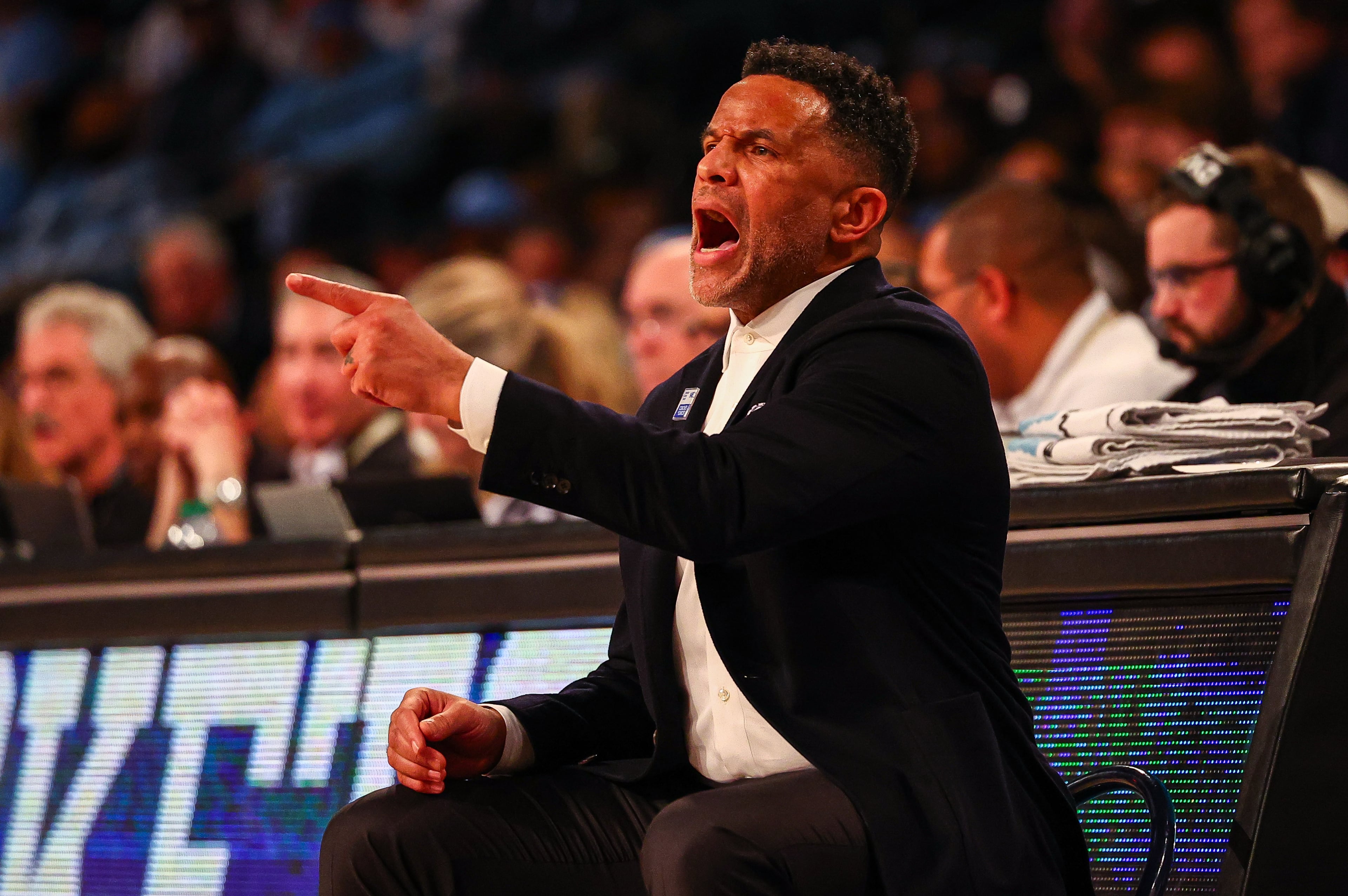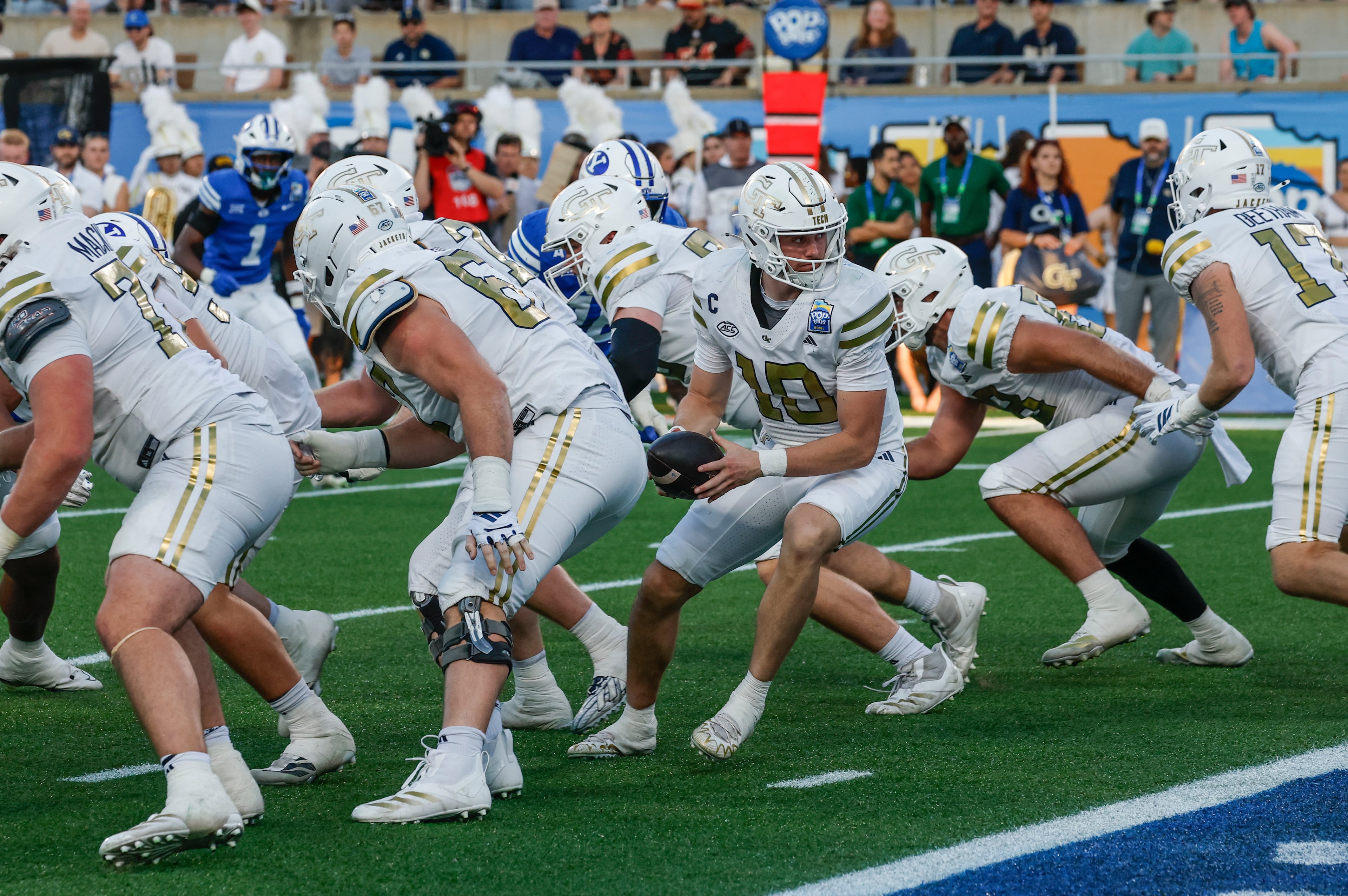5 takeaways from Georgia Tech’s loss to Virginia Tech

The pushing and shoving that Georgia Tech and Virginia Tech engaged in throughout Saturday afternoon at Bobby Dodd Stadium spoke to the mood of the day – two teams hungry for a win that also don’t particularly like each other.
But they can share this, even after the Hokies’ 26-17 win over the Yellow Jackets: Winning games in the ACC is a difficult errand.
“The difference between winning and losing, particularly this year, is paper thin,” Virginia Tech coach Justin Fuente said, a sentiment that Georgia Tech coach Geoff Collins has shared often.
The Jackets could have easily won Saturday’s game, but for one or two plays or penalties. They might have celebrated their tenacity in coming back from a 13-point deficit and the brilliance of running back Jahmyr Gibbs. Instead, they were left, once again, to taste the sourness of defeat and lament another close loss that leaves them at 3-5.
“It hurts, obviously,” quarterback Jeff Sims said. “Nobody likes losing. When you go out there and give it your all and you just go out there and battle and you’re still not coming out with the right outcome, it hurts.”
Five takeaways from the loss:
1. Penalties damaging
The Jackets’ chances were drastically impacted by two penalty calls in particular, one in the second quarter and another in the third. An offensive pass interference against wide receiver Kyric McGowan wiped out a 53-yard pass play from Sims to wide receiver Adonicas Sanders that reached the Virginia Tech 6-yard line. McGowan, running a crossing route the opposite direction of Sanders, picked Virginia Tech defensive back Jermaine Waller by appearing to deliberately getting in his path. The penalty pushed the Jackets back to their 26, a massive 68-yard swing. Georgia Tech was unable to convert the ensuing third-and-20 and punted.
In the third quarter, McGowan was flagged again, this time for a downfield holding on a 52-yard catch-and-run touchdown reception from Sims to Gibbs. Rather than putting up six points, the Jackets instead had a first-and-10 from the Virginia Tech 19 and settled for a field goal that cut the Hokies’ lead to 20-10. Collins was diplomatic in his response, but his wry smile when the subject of penalties was broached spoke clearly his displeasure with the two calls.
“We’ll watch and figure out how we can do things better, but those were two huge plays,” Collins said.
The holding call appeared quite debatable, as did the pass-interference flag to a lesser degree, and they were hugely impactful. That said, the Jackets could have responded better. After Georgia Tech punted away following the pass-interference penalty, the Hokies took over on their 10-yard line with 1:46 left in the half. Their play-calling and tempo indicated their intent to run out the clock until running back Raheem Blackshear ripped through the line for a 25-yard run on the second play, after which the Hokies sped up the pace and picked up another 37 yards to get in position for a field goal and a 20-7 halftime lead.
After the holding call on McGowan, the Jackets were flagged for holding again, this time on right tackle Ryan Johnson. It put the brakes on the drive, in which the Jackets managed a field goal. The penalties were undeniably costly, but so was the Jackets’ play afterward.
2. Superior play from Jahmyr Gibbs
In the loss, Gibbs was sensational. He ran for 113 yards on 11 carries, including a 61-yard burst in the fourth quarter, and caught four passes for 48 yards. His playmaking ability, enabled by his speed, agility, vision and drive, is truly something to behold.
Gibbs was aided by an offensive line that did its job in the run game, helping create 183 rushing yards on 30 carries. Left guard Paula Vaipulu, little-used until the Pittsburgh game, has looked increasingly effective.
“The O-line’s doing a great job up front with everything,” Gibbs said. “The new guys coming in, Paula, (right guard) Will Lay, they’re doing a great job stepping up for us. I can’t really take credit for it. Jeff’s finding me, so shout-out to Jeff.”
Gibbs’ three longest plays from scrimmage covered 123 yards, a hair more than a third of the 366 yards that the Jackets gained in all 56 offensive snaps. Further, he slipped and fell making a cut at the end of his 61-yard run and his 39-yard reception was likewise trimmed by a downfield holding penalty, meaning he could have had even more yards.
He finished with a career-high 223 all-purpose yards on 19 touches, his fourth game in a row with more than 150 all-purpose yards. It is a season worthy of All-ACC recognition, and it is unfortunate that Gibbs’ electric play has to this point largely gone for naught.
3. Collection of errors block path to victory
There were so many mistakes and missed chances. There were two blown coverages that led to Virginia Tech pass plays of 69 and 61 yards in the first half, the Hokies’ two longest completions of the season.
In the third quarter, Sims was sacked and lost a fumble when dependable left tackle Devin Cochran, possibly expecting help, was a step slow to parry the edge rush of defensive end Jaylen Griffin, giving him a clear shot at Sims. That turnover gave Virginia Tech the ball on the Jackets 17-yard line and turned into a field goal.
On a third-and-10 later in the quarter, Sims was off-target on a throw to wide receiver Nate McCollum – the collapsing pocket didn’t help – resulting in an incompletion and a punt, ending the possession as the Jackets were down 23-10 and time was beginning to run short.
In the fourth quarter, a failure to keep the pocket tight on the pass rush allowed Hokies quarterback Braxton Burmeister a gap to run for 24 yards on a drive that resulted in a field goal and a two-possession lead at 26-17. On the same drive, another defensive breakdown allowed Burmeister to hit tight end Nick Gallo for a 27-yard gain.
Virginia Tech’s performance this season doesn’t suggest it’s a much better team than Georgia Tech, if at all. That the Hokies were leave Bobby Dodd Stadium with smiles on their faces was in no small part because of the Jackets’ contributions. This followed Collins’ reminder earlier in the week about his team’s margin for error being “so small” and the team’s necessity for attention to detail on each play.
4. Defense rebounds, but not all the way
The Hokies chewed up the Jackets for 20 points and 333 yards in the first half, especially grievous considering the Hokies’ season per-game averages were 23.4 and 328.6, respectively.
“We like what we saw on film, that’s what I would say,” said wide receiver Tre Turner, who had a career day with seven catches for 187 yards and a touchdown.
Toward the end of the first half, defensive coordinator Andrew Thacker switched his unit from the 3-3-5 alignment that the defense had been playing out of since the Clemson game and back into the 4-2-5 that has been the defense’s base for Collins’ and Thacker’s three seasons.
“It’s the second week in a row that we basically got the opposing defense completely out of what they set out to do,” Virginia Tech coach Justin Fuente said.
Virginia Tech had some trouble adjusting to the change, scoring six points and gaining 158 yards after halftime. Still, Hokies running back Malachi Thomas gained 103 yards on 25 carries, his totals nearly even split between the halves.
“I really wouldn’t say there was any difficulty in stopping him, it’s just people have got to do their jobs,” Georgia Tech linebacker Quez Jackson said.
Also, the Jackets failed again to produce a turnover, an area that was to be a hallmark for the unit. Georgia Tech has one takeaway in the past four games after creating eight in the first four. And the Hokies converted nine of 18 third downs, their efficiency aided by being in third-and-4 or shorter on 11 of the third downs. Fuente said he told his team that the difference in the game would be the two yards that the offense could gain to be in second-and-6 instead of second-and-8, and vice versa for the defense.
“You can get pressure, you can get stops first and second down, but all that goes out the window if you can’t get off the field on third down,” said Jackson, who had a career-high 16 tackles. “That’s an issue that happened in the past with us, and I think it’s still our issue now. We have to get off the field on third down. There’s no other way around that.”
5. Hopes fading
In falling to 3-5, Georgia Tech’s hopes for a bowl game in Collins’ third season grew remote in a season when it was expected that fortunes would change after back-to-back three-win seasons. Among the fan base, confidence in his leadership would appear to be declining, as well.
“I’m just worried about that locker room and that team,” Collins said in response to a question about his message to fans.
The announced attendance of 35,543 was the smallest for a homecoming game since 1983. With games remaining against Miami, Boston College, No. 11 Notre Dame and No. 1 Georgia, the Jackets need to win three of the four to get to six wins and guarantee bowl eligibility, which, at the least, is a tall order. And while the remaining schedule is undeniably difficult, it’s also true that the Jackets failed to win two of the games that were most in their favor, home games against Northern Illinois and Virginia Tech.
If the Jackets don’t show something more than what they have through eight games, Collins will face pressure to make some sort of change on his coaching staff after the season, a move he would undoubtedly be loathe to do.



